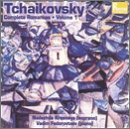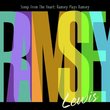| All Artists: Pyotr Il'yich Tchaikovsky, Nadezhda Krasnaya (soprano), Vadim Fedorovtsev - piano Title: Tchaikovsky: Complete Romances Volume 1 Members Wishing: 0 Total Copies: 0 Label: Russian Disc Release Date: 3/22/1994 Genres: Pop, Classical Styles: Vocal Pop, Chamber Music, Historical Periods, Classical (c.1770-1830), Symphonies Number of Discs: 1 SwapaCD Credits: 1 UPC: 748871107823 |
Search - Pyotr Il'yich Tchaikovsky, Nadezhda Krasnaya (soprano), Vadim Fedorovtsev - piano :: Tchaikovsky: Complete Romances Volume 1
 | Pyotr Il'yich Tchaikovsky, Nadezhda Krasnaya (soprano), Vadim Fedorovtsev - piano Tchaikovsky: Complete Romances Volume 1 Genres: Pop, Classical
|
Larger Image |
CD DetailsSimilar CDs
|
CD ReviewsFor the connoisseur... **** | **** | 02/21/2004 (5 out of 5 stars) "This 'Vol.1' is the first in a projected series encompassing the complete songs of Tchaikovsky. It appears however that the ensuing survey has not materialised. Mores the pity, for the Russian soprano Nadezhda Krasnaya (Ms Red in English)is very much at home in this repertoire. It is rather incongruous that the songs revealing so much of the essential Tchaikovsky, his inner-most world, so well-loved and well-known in Russia are almost completely unknown in the West. Granted the language barrier and the different 'understanding' of life have some bearing. Russians love to feel blue and suffer through life as we all know and this is so eloquently expressed in the lyric poems which Tchaikovsky chose to express in music.The word 'Romance' is the common Russian or rather adopted French word for the Art-song or Lied. There are however different genres that influenced Tchaikovsky's songs; firstly the salon element which occasionally surfaces as does gypsy and folk-idiom and add to that the oriental strain of the Mighty 5 Rimsky et al. and you get a fascinating mix and variety of songs.This album of early songs operi 2;6 and 16 and some unnumbered contain many gems are always beautiful and charming. Nadezhda aquits herself well with commitment and intensity to the music. What comes across is the expression, it is always sincere and not forced or put-on. The vales of slavic melancholy are traversed and plumbed. The themes of suffering and love's sadness explored not with self-lacerating screams but gently with resignation and a longing for peace and love. The popular song None but the lonely heart 'Nur wer die sehsucht kennt'with its climax on the words ....'how I suffer' etc are coached in a restrained manner.
Occasionaly Tchaikovsky runs riot in an unrestrained and extrovert way giving us too over-blown piano figurations in the pre-lude and post-lude of the song Reconciliation Op25 no1. The continual repetition of the same motive and the plagal cadence becomes cloying and melodrammatic (apparently in imitation of the gypsy style)Tchaikovsky dofts his hat in the direction of the Mighty 5 (BABOCUMURI)in the song 'Canary' with its oriental melismata. The song 'Wait' apparently inspired by Shakespeare is a highlight. Naghezhda is just magical in this. The middle part of the song reveals the power of nature to the lovers with the little 'sighs' in the accompaniment reminding one of the Romeo & Juliet overture.The soprano herself has a wonderfully expressive voice. Possessing a big drammatic soprano in the Russian tradition (including a slight wooble which is usually under control) she is able to shape her voice to the drammatic demands of the song. The top notes are there and are unleashed but always under control. It is not only the infinite shaping,colour and phrasing that make her a great Tchaikovian interpreter, it is the understanding of the sub-text and the word-poetry. The piano accompaniment by Vadim Fedorovtsev is able and always appropriate. However it's the technology that lets the side down here. The piano sounds like a tinny box with little natural resonance. There is a creeping reverb that crops up now and then. This ghosting is a little disconcerting to me. The recording engineers went to sleep? Also the breaks between tracks need more 'breathing space' to recover from the previous song.It is disappointing that the technology is not on the same level or in fact supports the singers artistry." |

 Track Listings (25) - Disc #1
Track Listings (25) - Disc #1



